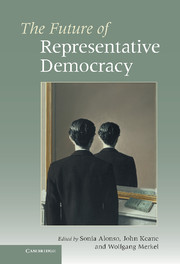Book contents
- Frontmatter
- Contents
- List of figures
- List of tables
- Notes on contributors
- Acknowledgements
- Editors' introduction: Rethinking the future of representative democracy
- 1 Representative democracy and its critics
- 2 Representative democracy and the populist temptation
- 3 The wider canvas: representation and democracy in state and society
- 4 Performance and deficits of present-day representation
- 5 Do parliaments have a future?
- 6 Engendering representative democracy
- 7 Representative democracy and the multinational demos
- 8 Diagnosing and designing democracy in Europe
- 9 Monitory democracy?
- 10 Representing nature
- 11 Democracy and representation beyond the nation state
- General bibliography
- Index
- References
5 - Do parliaments have a future?
Published online by Cambridge University Press: 05 June 2012
- Frontmatter
- Contents
- List of figures
- List of tables
- Notes on contributors
- Acknowledgements
- Editors' introduction: Rethinking the future of representative democracy
- 1 Representative democracy and its critics
- 2 Representative democracy and the populist temptation
- 3 The wider canvas: representation and democracy in state and society
- 4 Performance and deficits of present-day representation
- 5 Do parliaments have a future?
- 6 Engendering representative democracy
- 7 Representative democracy and the multinational demos
- 8 Diagnosing and designing democracy in Europe
- 9 Monitory democracy?
- 10 Representing nature
- 11 Democracy and representation beyond the nation state
- General bibliography
- Index
- References
Summary
Parliaments and legislatures are supposedly the central institution of representative democracy. Yet across all continents they come near the bottom of the list of institutions, public or private, in their level of citizen confidence or esteem. By way of illustration, here is what the Clerk to the Australian House of Representatives told colleagues in the Association of Secretaries General of Parliament in 2000:
During the last year the advertising industry, the news journalists and the used car salesmen of Australia had cause for rejoicing. Previously, they had been at the bottom of a list of professions ranked according to the public's perception of their trustworthiness. Members of Parliament were ranked just above them. However, a survey was released in July, altering the ranking … the survey placed the nation's legislators last in perception of trustworthiness in a list of professional groups.
(Beetham 2006a: 98–9)Or, to take an example from Europe, I read in a recent number of the Journal of Democracy that ‘only a fifth of Poles think that their parliament is useful’ (Rupnik 2007: 20). Such views are not isolated, but typical of consistent survey data across all continents. Is this anything new? Does it matter?
Let me begin by addressing the first question. There are perfectly understandable reasons why parliaments collectively as institutions have rarely enjoyed a particularly high or positive public profile. Let me mention just two.
- Type
- Chapter
- Information
- The Future of Representative Democracy , pp. 124 - 143Publisher: Cambridge University PressPrint publication year: 2011
References
- 13
- Cited by



